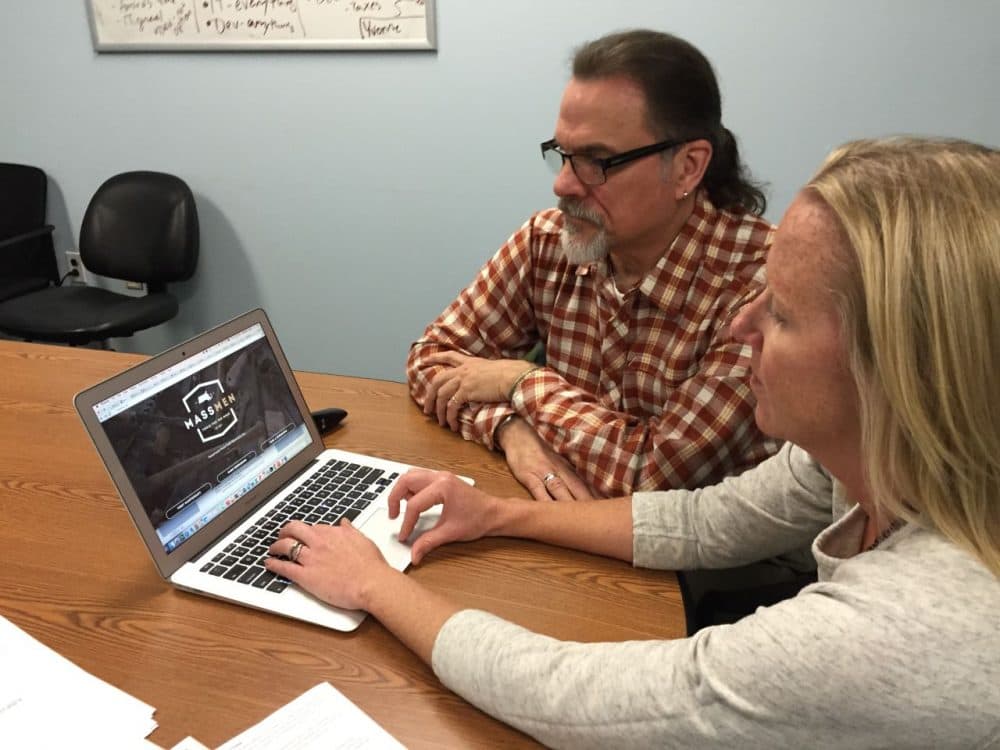Advertisement
Suicide Prevention Campaign Approaches Men 'On Their Own Terms'

Franklin Cook of Watertown knows the issue of suicide among men all too well. In 1978, when Cook was 24, his father killed himself.
After that Cook struggled with addiction and found recovery, suffered from depression but got treatment, and built a career in suicide prevention and suicide grief support.
He knows many men struggle to seek help for mental illness.
More men than women die by suicide, and across the country middle-aged white men have the highest suicide rate of any age group.
"But the care-giving world also doesn't market or doesn't design programs specifically around our species, if you will," Cook says. "[Some men] might not want to sit down face-to-face and talk to somebody for 55 minutes about their feelings. I've done that hundreds of times with a counselor, and it works for me, but it doesn't work for all men."
Now Cook is helping lead a Massachusetts suicide prevention campaign centered around a new website called MassMen.org. It was created by the Wellesley-based organization Screening for Mental Health, with funding from the state Department of Public Health.
On the site, people can complete an anonymous mental health screening in about two minutes to find out whether their feelings and behaviors are consistent with depression or another mental health disorder. They get results immediately and after the screening a "video doctor" does an interactive assessment.
"I'm concerned about your symptoms. I want to be sure you're aware of the impact this can have on your health and well-being," the video doctor, portrayed by an actor, says in one portion of the segment. "To help me understand how you feel about taking steps to feel less depressed, I have a question for you. On a scale of one to nine, how ready would you say you are to take steps to feel better?"
Advertisement
Candice Porter is executive director of Screening for Mental Health and a clinical social worker. She points out that while middle-aged men have the highest suicide rate, many of them may not be "moping around," appearing overtly sad or depressed.
"They might mask their symptoms in a lot of ways that we're not recognizing, and they're not seeking the help," Porter says. But she adds that even though the men might not seek counseling or treatment, many people who die by suicide visit their doctor for some physical ailment in the months leading up to their death.
"We do know that the primary care physicians are not asking the question, 'How are you feeling? Are you depressed? Have you had thoughts of wanting to end your life?'" Porter explains. "So part of what we're also trying to do is just increase awareness that these questions should be asked."
The MassMen site also directs users to resources including mental health services in their communities.
Screening for Mental Health is sharing its online assessment tool for free with hospitals and community-based health providers, as well as workplaces.
And the nonprofit organization is trying another approach to target men: directing them to a website called ManTherapy, which is based in Colorado and used in that state's suicide prevention efforts. The site features a mock therapist using exaggerated, sometimes raunchy humor that plays into stereotypes of masculinity.
"Most men think they shouldn't share their feelings, emotions and personal problems with other men. They're afraid of being made fun of or referred to as a girly man by their friends," says the character, Dr. Rich Mahogany.
Cook acknowledges the site won't appeal to everyone.
"And ManTherapy will be offensive, even, I think, to some," Cook says. "The reason we decided to use it is that it is an innovative approach to really cracking open the door around approaching men on their own terms."
After spreading word of the MassMen site with regional social media campaigns and billboards, organizers will collect data to find out if anonymous users have indeed found help for their mental illness or suicidal thoughts.
Resources: You can reach the National Suicide Prevention Lifeline at 1-800-273-TALK (8255) and the Samaritans Statewide Hotline at 1-877-870-HOPE (4673).
